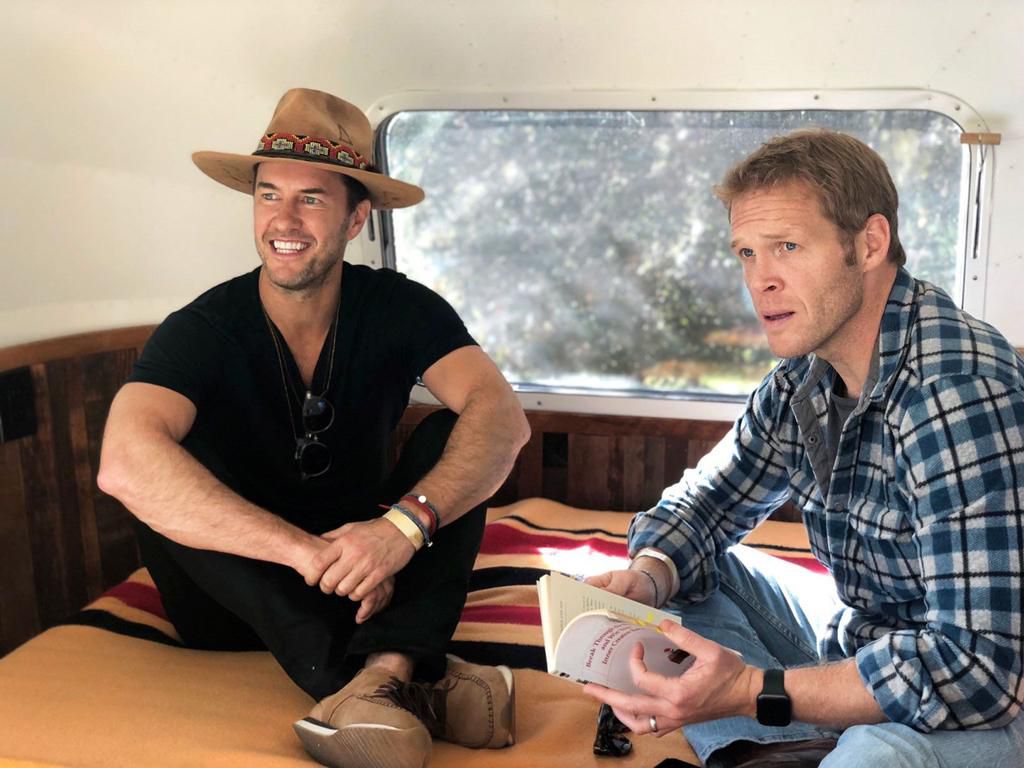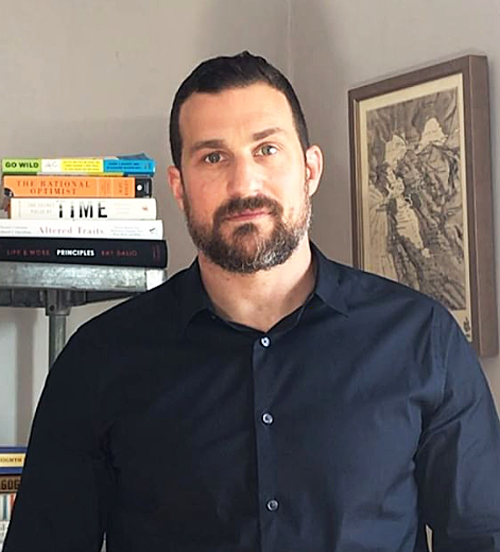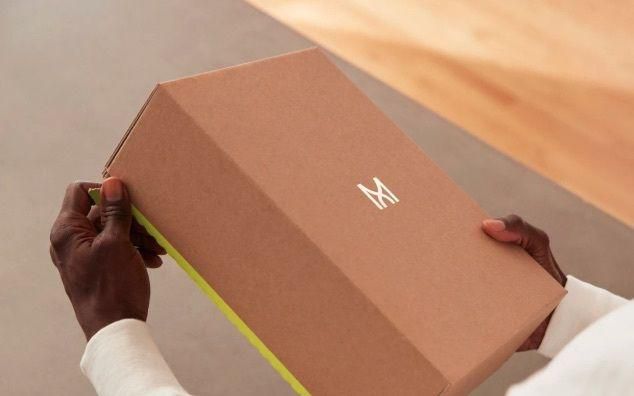This New Wellness Program Wants to Make Self-Improvement Easy—No, Really.
)
Dossett had served as a SEAL for almost a decade. In 2011, just a month after he left the Navy, several of his former teammates were shot down in a helicopter and killed. After you spend any period of time in the SEAL teams, youre going to feel broken and beat down, he says. And I didnt know what I wanted. That year, he attended several of his teammates funerals and worked as a surf guide/medic at a surf camp in Indonesia, and in 2012, he enrolled in the Wharton School at the University of Pennsylvania. Dossett intended to apply some of the lessons from his time with the SEALs to a business, but he wasnt sure what he wanted to create.

Dossett says much of the training required to become a SEAL is mentalyou learn to adapt and change your thinking, and to see that youre capable of more than you thought possible. You also learn to focus on whats in front of you, something he picked up during hell week, the brutal five-plus-day training camp all SEALs must endure. Trying to process the entire week at once is overwhelming, he says. Those who are most successful, myself included, tackle the week one step at a time. That lessonhow to change the small things in your day-to-day life to make big-picture changesstuck with him. Dossett landed at Google in 2013, but he yearned for what the Navy gave him: a sense of mission and a desire to serve the greater good.
Dossetts ambitions would have likely remained a side project or an unspoken goal, except that in saying them out loud to Mycoskie, a family friend, he was talking to someone who could actually make them happen and was used to helping others.
In 2006, Mycoskie founded Toms Shoes, its name shorthand for Tomorrows Shoes, its goal to get a pair of shoes to children in need around the world with each purchase. Soon Toms' espadrilles became a totem of well-dressed virtue, ubiquitous among brunch enthusiasts and hungover millennials. As Tomsand Mycoskies one-for-one modelturned into a phenomenon, he was lauded for doing well while doing good, but he began to sacrifice his own mental health for the companys growth. My relationships with my wife and kids suffered, and I started to resent Toms and all of the years that I had given to it, he says. After eight years, he sold half of his equity to Bain Capital, which valued the company at $625 million.
Despite his rsum and bank balance, success and global recognition couldnt solve the major problems he faced: what to do next, how best to continue helping people, how to be happier. I felt like I had checked all the boxes and had done everything my parents, society, and books had told me to do, he says. Mycoskie was diagnosed with mild depression in 2015, but with all he had going for him, he felt as if he didnt have the right to be depressed. I felt a void, he says. I was ashamed because I felt like I didnt want to admit to being depressed. Mycoskie started a social-entrepreneurship fund and spent the next two years on a decompression sabbatical, dabbling in different kinds of self-optimization. Thats why that night in Baja, Dossetts answer resonated. The ber-practical ex-SEAL and the Big Thinking do-gooder decided to try to create a self-help brand that would serve peopleand make money.
Not long after the surf trip, Mycoskie and Dossett made a plan. Mycoskie would put up the funds, and Dossett would leave Google to study human behavior and explore how to package best health practices into a self-help business. Their quest to find answers led Dossett to Andrew Huberman, Ph.D., an associate professor of neurobiology at Stanford University School of Medicine, in the summer of 2017. At the time, much of Hubermans research centered on the concept of neural plasticity, our brains ability to change in response to stimuli and thus learn and grow. Huberman explained that behavioral change can come about in two ways: all at once, in a high-intensity scenario (like a bad case of food poisoning that turns you off oysters forever), or as the result of small, incremental change. He argued that for people to realize their full potential in life, they often require the latter. The true way to change things is more like a staircase, he says. You take one step every day or couple of days, and slowly-ish, you arrive at the top.

Youve probably heard some version of this before, and so had Mycoskie and Dossett. But based on their research and discussions over two years with neuroscientists, psychiatrists, and exercise scientists from Harvard, Stanford, and the National Institutes of Health, they concluded that maybe change really was that simple. With Huberman and seven other expert advisors, the duo developed an evidence-based program consisting of ten 21-day challenges. Each challenge involves a process of attention, reward, and reinforcement. Some are what youd expect: foundational practices like fuel, sleep, hydration, breathing, and motion. Others are squishier: connection, gratitude, vision, clarity, and nature. Each one arrives in the mail, in a kit that contains the details of the challenge, a physical tool (like a water bottle with beads to keep track of your consumption or a timer that measures the length of your breathing exercises), and a booklet that explains the science. The timing, too, is intentional. Three weeks is short enough to keep someones attention but long enough to see a benefit from ones effort.
These challenges dont just help people forge deeper connections or habitualize better hydration. The meta goal is for users to develop a positive growth mind-set, a term coined by Stanford psychologist Carol Dweck, Ph.D., that means you believe your talents can be cultivated through effort and strategizing. The idea is that if everything is in place, including your hydration, sleep, and exercise, you can tackle whats next and ideally excel at it. Madeforits name comes from the notion that through change, you unlock your potential and discover what youre made forlaunched in beta in June 2019, enrolling more than 1,300 members.
They had plenty of competition. App stores are loaded with options that promise to help Americans fix whatever it is they think theyre doing wrong. (Sleep, fitness, life, love: If youre doing it, theres an expert wholl tell you youre doing it wrong and some kind of paid app thats meant to help you get better at it.) The entire market for self-care (and its more bullish cousin, self-optimization) is built on insecurities, real and imagined, and the mens segment is especially fraught, given the stigma that persists among men around having conversations about their mental health. Consequently, self-care for men is often masked in urgent, brazen messaging; some mens brands seem to argue that happiness in life can be achieved through sexual fulfillment. Hims, a wellness site and online pharmacy, aspires to create a handsome, healthy you through pills for erectile dysfunction (in addition to ones that will help fix other apparent problems plaguing guys, like performance anxiety, hair loss, and acne). It relies on this language to heighten your expectations for overnight fixes.
Mycoskie and Dossett want Madefor to be the exact opposite of that. Theres no bullshit, Mycoskie says. There are no special promises that this is going to change your life tomorrow. And unlike dozens of other programs, Madefor is designed to be tech-freethere are no digital wearables, no online manualssave for a private Facebook group for members. Huberman says there are benefits to going analog in a world full of people glued to their smartphones. Theres a richness to analog interactions thats amplified now that were all digitally wired, he says. When you do something in analog, its salient, it stands out, and its all the more powerful.

With Madefor, simplicity isnt cheap, but having skin in the game can help you commit to a program like this, says Christine Whelan, Ph.D., a clinical professor of consumer science at the University of Wisconsin-Madison. And theres definitely skin: You pay $750 for the ten-month plan or $95 for month-to-month. But Mycoskie the entrepreneur has met Mycoskie the philanthropist, and the company offers deeply discounted scholarship memberships to qualified applicants.
This past spring, Madefor quietly reached the public amid quarantine.
Dossett says the beta participants and those whove signed up since its launch report that they feel calmer, healthier, and happier and that their relationships have improved. Some have lost weight, even though thats not a goal. And during the coronavirus pandemic, the program has also provided its members with a surprising lifeline. Were helping people realize they have the ability to exert control in powerful ways, says Dossett.
In a time of so much uncertainty, maybe this is the right moment for a box to arrive at your door with one thing you can control, one thing you can work on to help you get closer to the life you want. Madefors founders dont expect every challenge to be revelatory for everyone. Even they admit that there are a few habits theyve stuck with and a few theyve let go. And thats part of the deal. As much as its about boxes and rest and gratitude, Madefor is about understanding yourself and how to get better at being you.

)
)
)
)
)